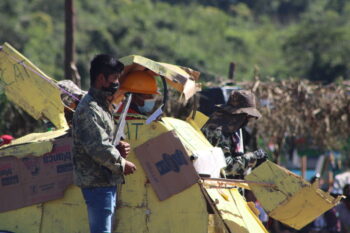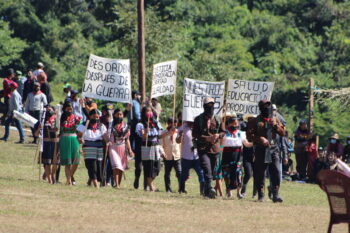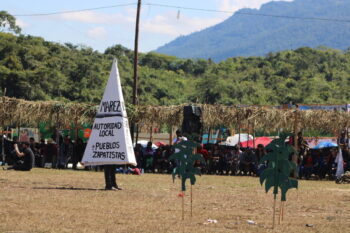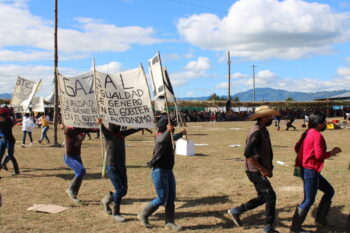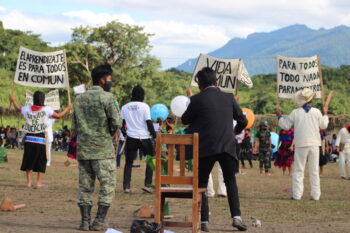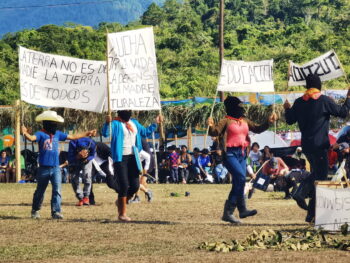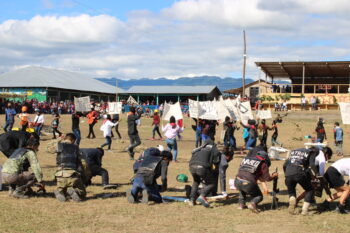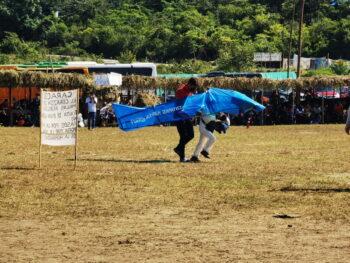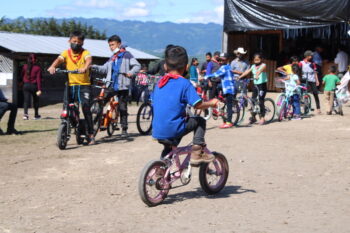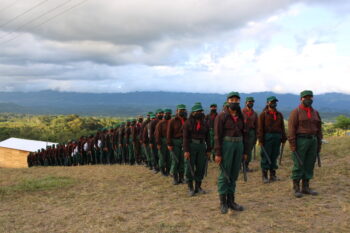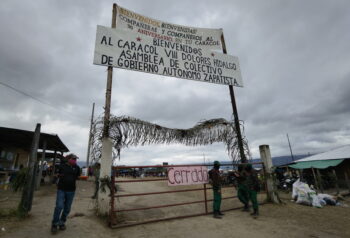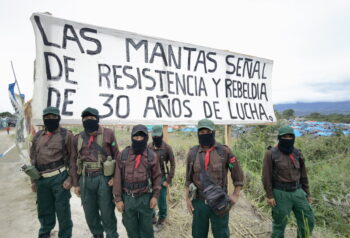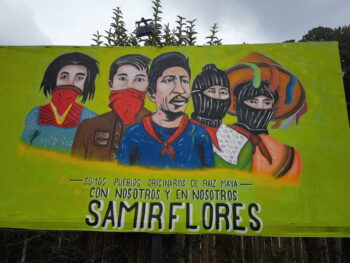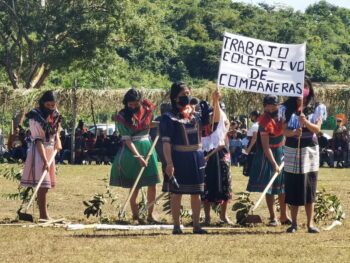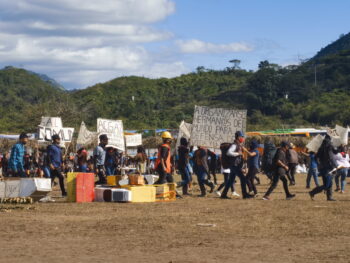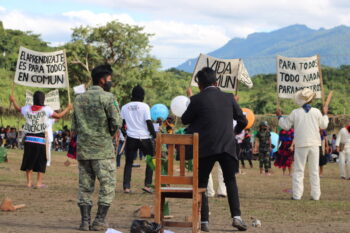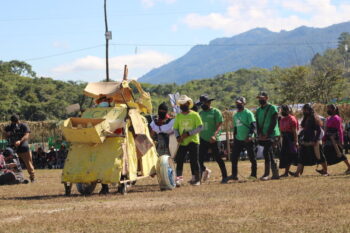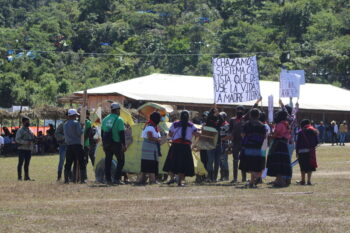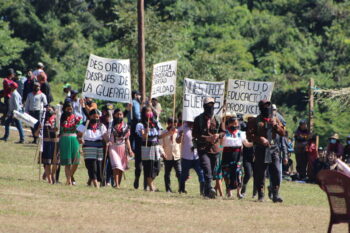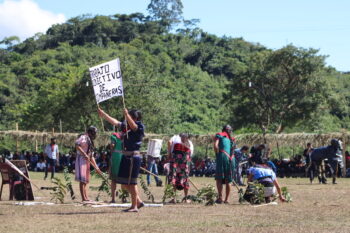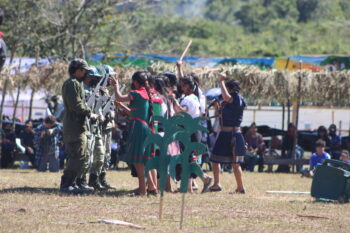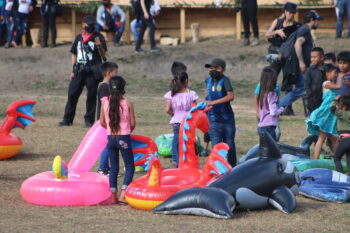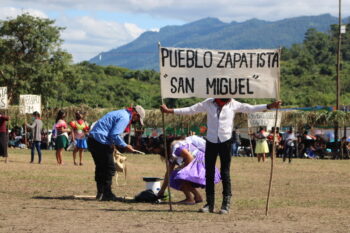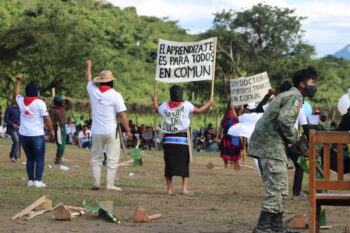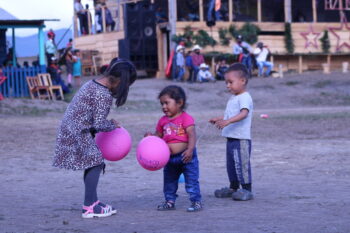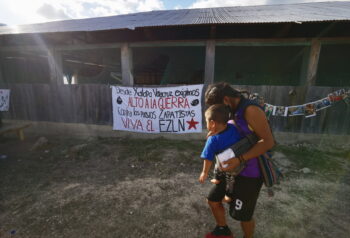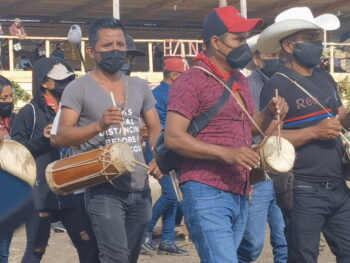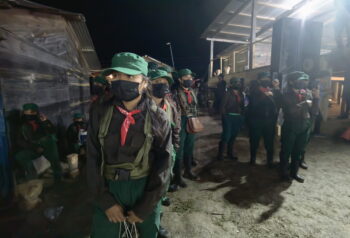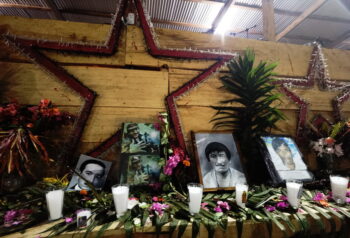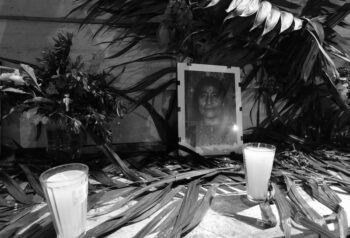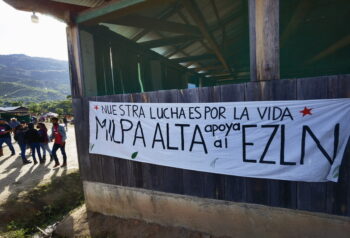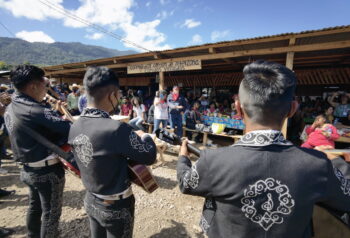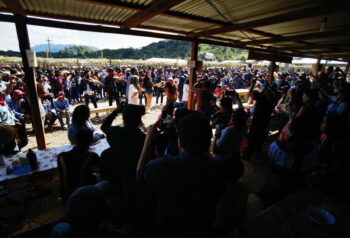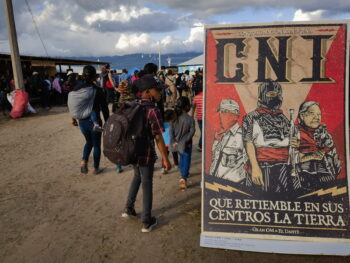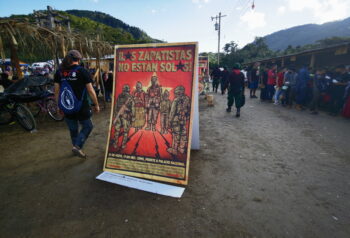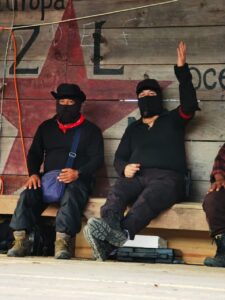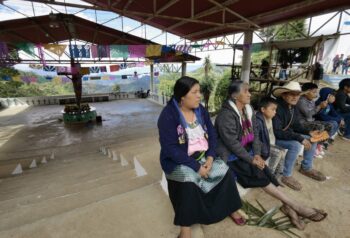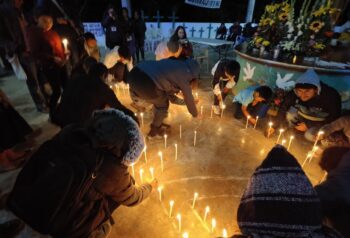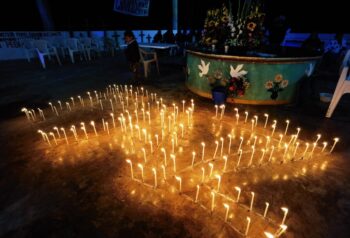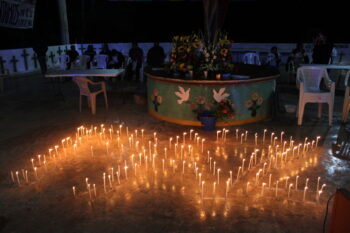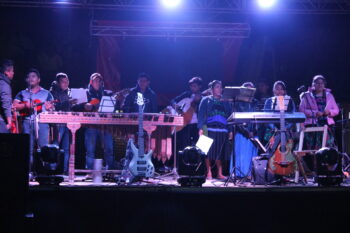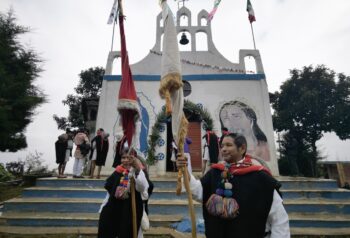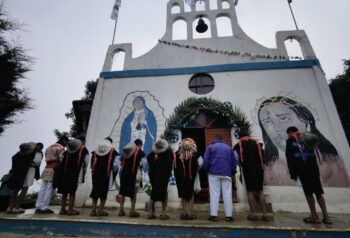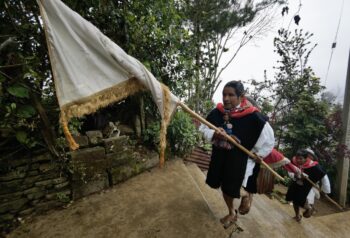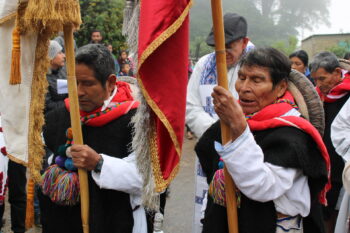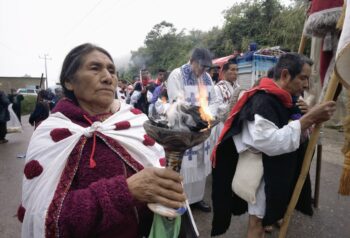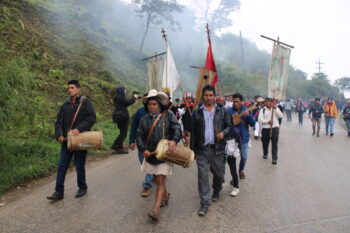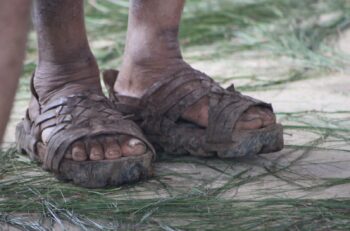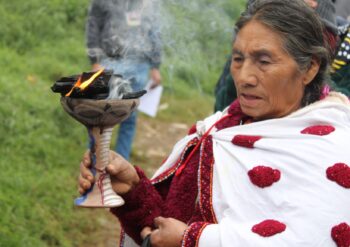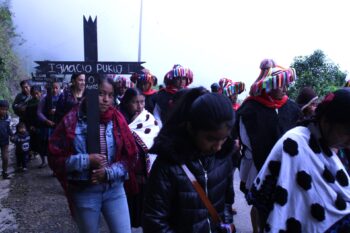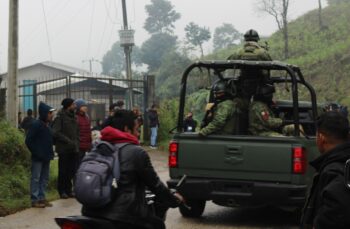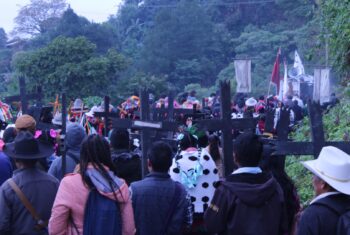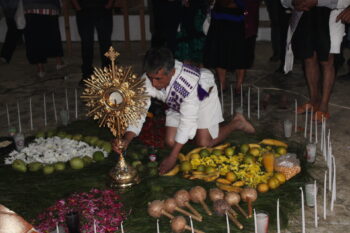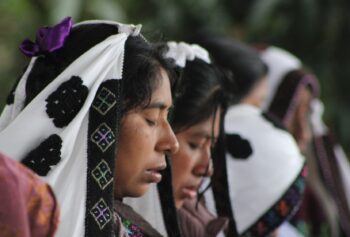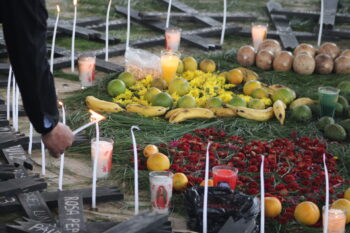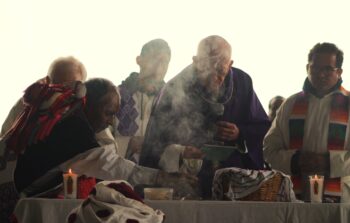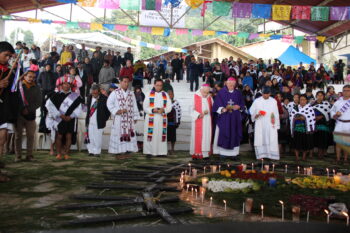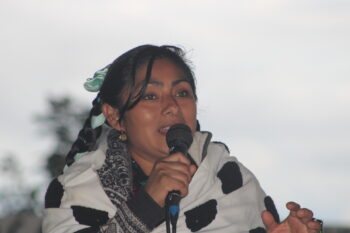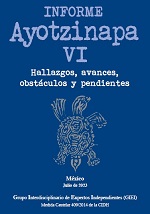
Video
(Español) Saludo del Movimiento de Mujeres de Kurdistán para el EZLN en el 30 aniversario del levantamiento
En ocasión del 30 aniversario del levantamiento zapatista, el Movimiento de Mujeres de Kurdistán envía este saludo para el EZLN.
(Español) 30 Aniversario del Levantamiento Zapatista: Lo común y el autogobierno
¿Cómo enfrentar la crisis civilizatoria que vivimos? ¿Cómo enfrentar la devastación medioambiental, la crisis energética, la guerra, la reproducción de la violencia, la creciente polarización de la riqueza, la descomposición social, la brutalidad del crimen organizado y desorganizado?
Son éstas las preguntas que el zapatismo se ha planteado a lo largo de la última década. Y es a estas preguntas que el zapatismo responde con el nuevo camino que se abre al celebrar el 30 aniversario del levantamiento armado de 1994: lo común y el autogobierno. Así lo resumió el Subcomandante Insurgente Moisés en su discurso poco antes de la media noche el 31 de diciembre de 2023: “La propiedad debe ser del pueblo y común, y el pueblo tiene que gobernarse a sí mismo”.
La teoría fue detallada en los 20 comunicados publicados entre octubre y diciembre de 2023, en especial la novena parte, donde se explica la nueva estructura del autogobierno zapatista, y la vigésima parte, donde se habla de lo común y la no propiedad. La práctica, sobre la que se basa siempre toda teoría zapatista, es la que ya se lleva a cabo en las comunidades rebeldes. Mientras los medios de comunicación “de paga” se empeñaron en decir y repetir que el zapatismo ya no existe, lo que presenciamos los miles de personas que acudimos al Caracol VIII, “Resistencia y Rebeldía: Un Nuevo Horizonte”, inaugurado hace tres años en el poblado Dolores Hidalgo, cuenta una historia muy diferente, visible ya desde el trayecto hasta el lugar del encuentro: decenas de comunidades con letreros anunciando “Gobierno Autónomo Local Zapatista”. Eso sin hablar del gigantesco espacio que nos recibe, donde se congregan unos 10 mil zapatistas, sobre todo jóvenes y jóvenas, que nos deleitan con obras de teatro, música y poesía, y un gran contingente de milicianas y milicianos.
Es significativo que la celebración se realice aquí, en el mismo lugar donde hace 18 años se llevó a cabo una de las reuniones preparatorias para lo que sería la Otra Campaña. Un lugar donde, como explicó el entonces Subcomandante Marcos, existió otrora la finca Campo Grande: más de mil hectáreas de tierras fértiles con abundante agua, pista de aterrizaje, caminos y “miles de indígenas a quienes explotar, despreciar, violar, engañar, encarcelar, asesinar”. Estas tierras fueron recuperadas en el levantamiento hace 30 años, y desde entonces en ellas se construyen la autonomía, la justicia, la salud, la educación, la democracia, la libertad.
En este lugar, que tanto dolor experimentó antes del levantamiento, jóvenes de diferentes caracoles presentaron obras de teatro donde representaron el caminar zapatista en estos 30 años y los grandes cambios que se anuncian ahora (aunque se vienen implementando desde hace algún tiempo). Si quienes llegamos de otras geografías esperábamos que nos explicaran mejor las propuestas delineadas en los comunicados, fue por medio de esas obras que respondieron nuestras muchas preguntas.
Democracia
En 2003, ante la negativa del Estado mexicano de reconocer los Acuerdos de San Andrés, se fundaron los primeros cinco caracoles y las Juntas de Buen Gobierno (JBG), que junto con los consejos autónomos de los Municipios Autónomos Rebeldes Zapatistas (MAREZ), representaron una de las experiencias de autogobierno y democracia directa más importantes del mundo. En estos 20 años, las JBG mostraron al mundo que es posible crear una forma de gobierno fuera de la lógica del Estado liberal y de la democracia representativa. Un gobierno colectivo, rotativo, sin salarios ni prebendas ni mucho menos enriquecimiento a costas del erario público.
Y sin embargo, a partir de una intensa autocrítica, se pasa ahora a una forma aún más horizontal y más democrática de gobierno, centrada en las asambleas comunitarias, donde todas y todos participan: los Grupos de Autonomía Local (GAL). Como mostraron las y los jóvenes en las obras de teatro, cuando algo no se puede resolver al nivel local, se convoca un Colectivo de Grupos de Autonomía Local (CGAL), que reúne delegados de varias comunidades cercanas. Y cuando tampoco a este nivel se puede resolver un asunto, se convoca una Asamblea de Colectivos de Grupos de Autonomía Local (ACGAL), a nivel de zona, que se reúne en un caracol.
Lo Común
La frase que más se escuchó en estos días de celebración fue “Lo común”, un desafío radical al fundamento mismo del sistema capitalista: la propiedad privada. La propiedad, como dijo el Subcomandante Moisés, “debe ser del pueblo y común”.
Después del levantamiento, cuando los finqueros, que durante tanto tiempo explotaron y violentaron a los indígenas, huyeron, se recuperaron grandes extensiones de tierra. Pero muchas de esas tierras quedaron en una suerte de limbo legal, lo que ha ocasionado incontables conflictos por la tenencia de la tierra a lo largo de todos estos años. Se diría que los zapatistas lucharían por lo tanto por obtener los documentos legales de la propiedad de la tierra que, con la sangre de los caídos, recuperaron en 1994. Pero no. Como explica el Subcomandante Moisés en el vigésimo comunicado, “Los papeles de propiedad no dicen ‘esto es tuyo’, lo que dicen es ‘esto no es de aquél, atácalo’”.
Por lo tanto, en vez de eso, el zapatismo propone (y pone en efecto) la no propiedad. A la “base material de la producción”, que hasta ahora consistía en una combinación de trabajo individual-familiar y de trabajo colectivo, se le suma ahora lo que llaman “trabajo en común” o “no propiedad”. O sea, porciones de tierras recuperadas que no tienen dueño, que no son de nadie (y por lo tanto, son de todos). Es tierra que no se vende ni se compra, que se trabaja por turnos y cuyos frutos pertenecen a quienes la trabajan. Y lo más ambicioso: tierras donde se invita a trabajar también a no zapatistas: partidistas, migrantes, citadinos, desplazados, extranjeros… quien quiera que sea, siempre y cuando exista acuerdo en las GAL, CGAL y ACGAL. “Todo lo que sirva al bien común, nada que vaya contra el bien común.”
Se prevén problemas, desde luego, y eso queda muy claro en las obras de teatro. Para que lo común funcione, es necesario construir una ética colectiva. Una ética del bien común. Una ética que se construye no con discursos, sino en la práctica. En la práctica de una justicia digna basada en el diálogo y el consenso. En la salud autónoma, que se entiende no como mercancía, sino como un derecho de todas y todos. En la educación fundamentada en las necesidades de los pueblos, y no en la homogenización de una supuesta “nación mestiza” impuesta desde el Estado. En la comprensión del bien común como camino para el bien individual y familiar. En el respeto y la dignidad.
La urgencia y la mirada hacia el futuro
Los zapatistas no están mirando solamente hacia las comunidades. No se preocupan únicamente por su supervivencia ante la violencia del narcoestado y el desenfreno del capital. Nos lanzan un posible salvavidas ante una crisis global que nos afecta a todos y todas. Si es el capitalismo, por naturaleza depredador, pero ahora enloquecido con una voracidad sin precedentes, lo que está destruyendo el planeta, la pregunta es: ¿cómo destruir el capitalismo?
“No es necesario matar”, dice el Subcomandante Moisés, y dicen también las obras de teatro. La crisis climática y el agotamiento de los recursos naturales nos conducen a un futuro apocalíptico. En ese proceso, se desata una guerra de todos contra todos, como vemos con elocuencia en Chiapas y en tantos otros lugares. Ante eso, es necesario regresar a la tierra, regresar a lo que los antepasados nos han enseñado. Y es necesario también construir una ética de lo común. En todo esto, nos quedó claro el papel que desempeña la mujer en esta nueva fase de construcción del futuro. La mujer, dadora y cuidadora de vida, es quien más entiende y practica la ética de la comunalidad. Una ética basada en el cuidado, en la compartición, en el respeto, en el compromiso unos con otros. Eso nos enseñaron a lo largo de los cuatro días de celebración de tantas maneras. Con la atención de la salud autónoma cuidadosa y gratuita. Con la cocina colectiva que con tanto cariño nos alimentó. Con las conversaciones, los partidos de baloncesto, voleibol, futbol. Con la alegría de las y los niños desfilando en sus bicicletas. Con la extraordinaria organización colectiva que hizo posible que unas 12 mil personas convivieran durante cuatro días en ese espacio de libertad y colectividad.
Poco antes del discurso del Subcomandante Moisés, la fuerza de la organización zapatista se hizo presente con el desfile de milicianas y milicianos. Un desfile que fue no sólo demostración de disciplina y organización militar, sino también de alegría y celebración, cuando las milicianas rompen filas para bailar.
Del caracol de Dolores Hidalgo regresamos a nuestras geografías con la esperanza renovada de que es posible construir otros caminos en medio del desastre. De que es posible bailar bajo la tormenta. Y de que el camino requiere mucho compromiso y organización, para romper con el individualismo y el sálvese quien pueda, construyendo lo común.
